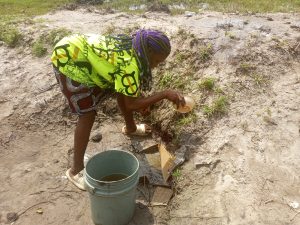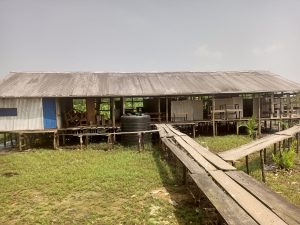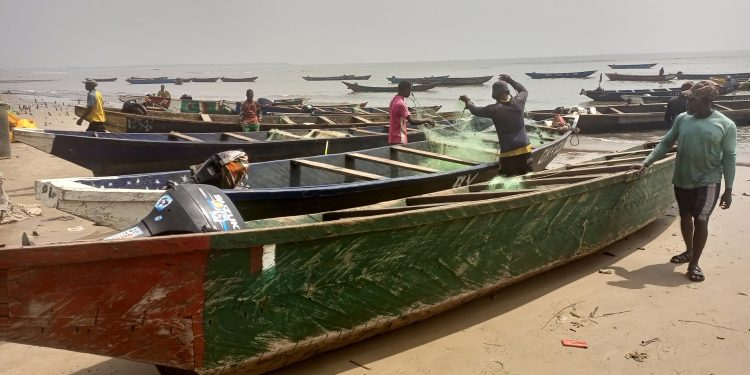Story, by Ayang Macdonald
As one disembarks from a speed boat at the shores of the main settlement of Idabato in the Bakassi peninsular, one of the first points of attraction is a fleet of similar boats, either anchored or scooting around the coastline with fishermen on board. This place is the gateway into the administrative seat of Idabato sub division in the Bakassi peninsular in South west Cameroon, an area that is host to more than 70 settlements (not villages), and over 50,000 inhabitants.
This is a lively and bustling settlement where fishing is the life wire of residents. But despite the many natural blessings of this area once under Nigerian control, residents paradoxically do not have water to drink. All of the water that surrounds them is salty and not good for human consumption. Not just water, they also lack many other social amenities which would otherwise make life comfortable for them. For a reminder, Cameroon regained full administrative control over Bakassi in August 2008 (15 years ago), following the Green Tree Accord in 2006.
“Do you see that small patch of water over there? That is where people get water to drink. There is no potable water scheme here. We don’t have taps,” the Divisional Officer for Idabato, Roland Ewane, tells this reporter, pointing to a puddle of brownish stagnant water.
A few moments later, a pre-teenage girl shows up with a hand-held bowl to scoop some dirt and mud out of the shallow body of water.

“I am here to clean our water source. This is the place where we fetch our water to drink, cook and do other house chores,” the girl says in a rather timid tone.
Many residents of Idabato are peasants who cannot afford to drink bottled water sold in local stores in the community.
Samuel Edet, a Nigerian fisherman and engine boat driver, says if there is one problem he would like the government of Cameroon to address, it is the issue of potable water.
“I am a Nigerian who lives in Idabato. I make my living from driving an engine boat. I work for a company called IMA Transporters. We are very happy to be here, and we live in peace with our Cameroonian brothers and sisters. The only thing I want to ask the government to give us is drinking water,” says Edet.
The Divisional Officer of Idabato (the government representative in the district), Roland Ewane, describes the lack of drinking water as one of the biggest problems plaguing the community.
“When I go to mainland Cameroon and tell my friends that my people in Idabato lack drinking water, some of them ask me why Idabato doesn’t have water, whereas the place is inside water. I tell them the water we have here is salty and that it is not good for drinking and for other domestic uses,” Ewane explains.
“Things are a bit better during the rainy season as people depend on rain water. In the dry season, it’s hell. It is my hope that sooner or letter, the government will do something to respond to this problem. If this problem is solved, Idabato will be a wonderful place to live in.”
Acute housing shortage
When you land in Idabato, you will hardly find a well-constructed house, except for a few government structures such as the council which was recently put up with funding from the Special Council Support Funds for Mutual Assistance (FEICOM), a government agency assisting councils in executing development and infrastructure projects.
All houses there are suspended from the ground to a height of about one metre with either plank or concrete pillars, due to the waterlogged and marshy nature of the area.

The houses are mostly built with semi-permanent structures, with locals expected to make periodic maintenance due to the erosive nature of the sea which sometimes batters the settlement, destroying houses close to the seashore.
In the view of Ewane, this problem can be tackled by the implementation of a low-cost housing scheme in the community. In the NDS30, the government envisages a Cameroon where there should be decent and affordable housing for all by the year 2030.
“This is one of the reasons why many people don’t like coming here because it will be very difficult for them to find a house to stay. If the government can do something in this regard in terms of low-cost housing, it’ll be a wonderful thing,” he notes.
“We plead with the government to construct many of such houses here. My service heads don’t have where to stay. We don’t have offices. I work from a council guest house. Many government structures have been washed away by water. The government invested a lot of money here on many infrastructures, but today, you can’t find any.”
Other than water and housing, the people of Idabato say they are in real need of many other social amenities like hospitals, electricity and mobile telecoms services not only to make life easier for them, but also to strengthen their sense of belonging to a country now officially in control of where they have settled for decades.
A booming fishing industry
Like the bustling engine boats on the shores of Idabato, fishing is the engine that drives the local economy in the community. Nine in 10 persons in Idabato will tell you they are engaged in fishing, and that is what enables them to earn a living.
“My husband is a fisherman. I smoke and sell fish here. Sometimes, some people come to buy our fish here. But I prefer to take it to Nigeria,” says Rebecca Samson, a Nigerian woman this reporter met at the local fish market in Idabato.
Ther market is as busy as a beehive and the commonest items you find on sale are fish and shrimps.
“It is a very profitable business. This is what helps me to take care of my family. I have a beautiful wife and seven children to feed,” says Gilbert Obong, a fisherman who says he hails from a locality near Calabar, the capital of the Nigerian state of Cross River.
As the Idabato Divisional Officer puts it, the fishing industry there is one that people can take advantage of in order to earn a living.
“The fishing industry here is a very big one. I appeal to Cameroonians wherever they are, to come and take advantage of this very profitable activity. Instead of staying in towns and cities doing nothing, they should come here, work and earn a living,” he says, adding that the sector can also be harnessed in order to become more profitable.
Some of the engine boats that transport huge baskets of fish either to Nigeria or other parts of Cameroon belong to a maritime transport company called International Maritime Association Transporters (IMA Transporters). Its Vice President, Ogo Olowole, a Nigerian, says their service is very crucial for the local economy.
“We transport people and goods from here to different parts of Nigeria and Cameroon. Our fares are not too high but they depend on the price of fuel at any given time,” the IMA Transporters boss says.
Peaceful cohabitation
For a small, yet polarised community that is 95 percent Nigerian and just five percent Cameroonian, one would have expected recurrent social tensions among residents in Idabato. That is not the case.
Instead, people from the different communities have embraced each other and putting the virtue of ‘living together’ trumpeted by the Cameroonian government into practice.
“The majority of people who live here are Nigerians, but they live well with us Cameroonians. The Nigerians see us as their family and there is no discrimination of any sort,” says Ferdinand Beng, a Cameroonian fisherman and council police agent in Idabato.
“There is peaceful cohabitation. ‘Living together’ has been our watchword. We have emphasized the need for the people to live in peace and harmony with one another. We don’t have any conflict between one community and the other,” the DO notes.
The challenges faced in Idabato notwithstanding, the community is worth a trip for lovers of countryside destinations.








